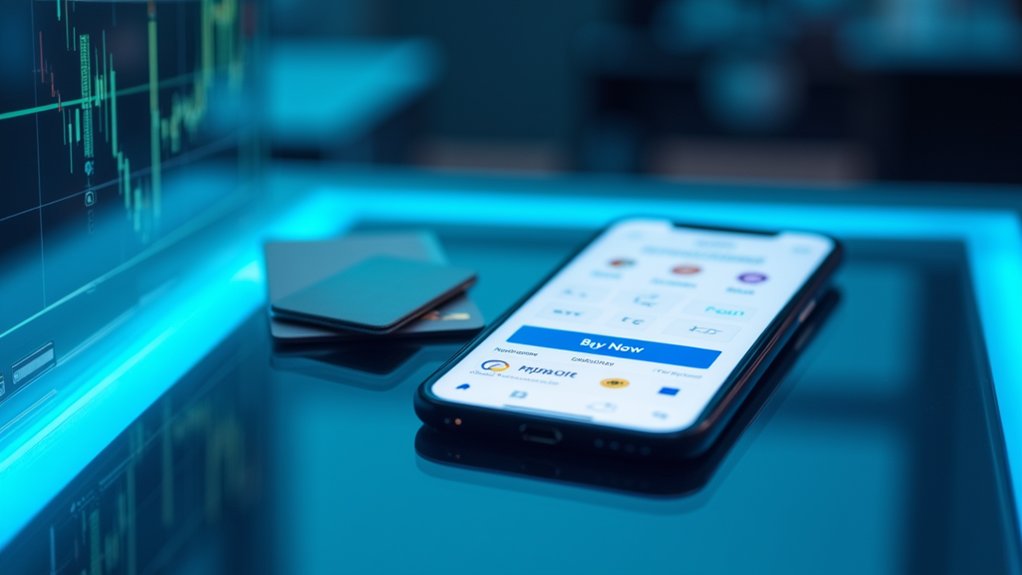Purchasing cryptocurrency instantly requires selecting a platform with expedited services like MoonPay, Paybis, Kraken, or CoinFlip. Users can complete transactions within minutes using credit cards, debit cards, or digital wallets like Apple Pay and PayPal, with minimum purchases starting around $20. Security measures include AES-256 encryption and immediate transfer to personal wallets for ideal protection. Transaction verification processes have been streamlined to accommodate the growing demand for immediate digital asset acquisition. The following sections explore additional acquisition strategies for maximizing investment potential.

Many investors seeking to diversify their portfolios or capitalize on cryptocurrency market opportunities require efficient, reliable methods to acquire digital assets in place of procedural delays. The cryptocurrency marketplace now offers multiple pathways for immediate Bitcoin acquisition through platforms like MoonPay, Paybis, Kraken, and CoinFlip, each providing distinct features tailored to various user requirements, including automatic wallet creation for first-time purchasers and incorporation with localized payment methods across more than 180 countries.
Modern crypto platforms eliminate traditional barriers, connecting investors to Bitcoin through streamlined, globally accessible services.
Transaction processing occurs through several established payment channels, with credit and debit cards enabling the most rapid acquisitions, while bank transfers via SEPA, UK Faster Payments, and US banking networks offer alternatives at potentially lower fee structures. Digital wallet services, including Apple Pay, Google Pay, PayPal, and Venmo, provide additional convenience for users already embedded within these ecosystems, with some platforms implementing pre-funded balance features to expedite subsequent transactions and minimize processing delays. MoonPay offers AES-256 encryption and PCI-DSS compliance to ensure transaction security for users buying cryptocurrency.
Wallet configuration represents a critical consideration for new cryptocurrency investors, with platforms typically offering automatic wallet generation at checkout or compatibility with established third-party solutions like Ledger and Trust Wallet. For enhanced security, many experts recommend transferring purchased cryptocurrencies to a personal wallet immediately after acquisition. Security experts consistently recommend hardware-based cold storage solutions for substantial holdings, supplemented by robust authentication protocols including two-factor verification and stringent password management to mitigate unauthorized access risks.
The transaction parameters themselves demonstrate considerable flexibility across providers, with minimum purchase thresholds beginning at approximately $20 on platforms like MoonPay, while verification-dependent processing times can deliver confirmations in as little as two minutes for identity-verified accounts. Paybis offers a first-time buyer advantage with no fee on initial transactions, making it particularly attractive for newcomers to cryptocurrency investing.
Dollar-cost averaging through recurring purchase orders represents an increasingly popular strategy to mitigate volatility exposure, allowing investors to spread acquisition costs across multiple time periods rather than assuming single-point market risk.
Post-purchase options extend beyond simple holdings, with investors increasingly leveraging their digital assets for merchant transactions, decentralized finance applications, staking rewards, and portfolio diversification strategies, reflecting the maturing ecosystem surrounding cryptocurrency ownership and its incorporation into broader financial planning frameworks.
Frequently Asked Questions
What Are the Tax Implications of Buying Crypto Instantly?
Purchasing cryptocurrency instantly does not, by itself, trigger immediate tax consequences, since the IRS treats the acquisition as establishing a cost basis for future calculations.
However, the taxpayer must maintain accurate records of the purchase price, including transaction fees, because this information becomes critical when the asset is eventually sold, traded, or used, at which point capital gains or losses will be calculated based on the difference between acquisition and disposition values.
Can I Use My Retirement Account to Buy Cryptocurrency?
Investors can access cryptocurrency through retirement accounts via self-directed IRAs (SDIRAs) offered by specialized custodians like Bitcoin IRA and iTrustCapital, which typically feature higher fees than traditional retirement accounts.
For 401(k) holders, options remain limited unless employers offer specific crypto-compatible plans, though Fidelity's Digital Assets Account represents a significant exception.
Alternatively, exposure through recently approved spot Bitcoin ETFs provides an indirect investment pathway within conventional retirement accounts, maintaining tax advantages while mitigating direct custody risks.
How Do Instant Crypto Purchases Affect Transaction Fees?
Instant cryptocurrency purchases typically incur higher transaction fees compared to standard exchange orders, primarily due to the application of taker fees for immediate market execution.
These premium fees, often ranging from 0.40% to 1.5% of transaction value, reflect the convenience of instant liquidity and guaranteed execution price.
Additionally, payment method surcharges may apply, with credit card purchases generally commanding the highest premiums, while ACH transfers or wire deposits usually offer more cost-effective alternatives for frequent traders.
Are There Purchase Limits When Buying Crypto Instantly?
Instant crypto purchases are subject to varying platform-specific limits.
CoinJar typically imposes a $10,000 daily limit, while Crypto.com's limits range from $300 to $30,000 based on user tier status.
Additionally, frequency restrictions apply, with Crypto.com capping users at 5 daily Instant Deposit transactions regardless of tier, and CoinJar limiting card linkages to 3 active payment methods.
Monthly caps further constrain transactions, with Crypto.com offering tiered limits from $10,000 to $150,000.
What Documents Are Needed to Verify Identity for Crypto Purchases?
Common documents required for crypto identity verification include government-issued photo IDs (passports, driver's licenses, or national ID cards), proof of address (utility bills, bank statements, or tax documents within 3 months), and biometric verification through facial recognition.
Exchanges typically implement tiered verification systems, with higher transaction limits requiring additional documentation.
Verification requirements vary by jurisdiction, with many platforms utilizing digital-first processes and automated verification systems for regulatory compliance.









